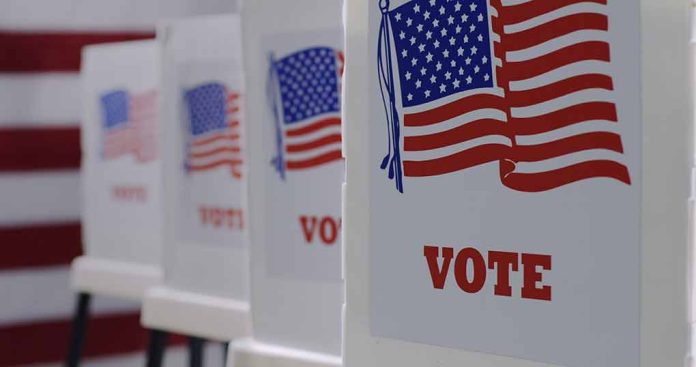
North Carolina adapts voting procedures in the wake of Hurricane Helene to ensure fair access for all voters, including those displaced by the disaster.
At a Glance
- Hurricane Helene has caused significant devastation in Western North Carolina, affecting election processes
- Over 190 people have died, and many are missing; infrastructure damage has isolated towns and disrupted utilities
- The State Board of Elections has implemented changes including adjustment of early voting sites, extended voting times, and emphasis on absentee voting
- Multi Partisan Assistance Teams have been introduced to support and guide displaced voters
- Provisional ballots are available for individuals unable to present the necessary state photo ID due to disaster-induced circumstances
Hurricane Helene’s Impact on North Carolina Elections
Hurricane Helene has wreaked havoc on Western North Carolina, causing significant disruptions to the state’s election processes. The devastating storm has claimed over 190 lives, left many missing, and caused extensive damage to infrastructure, isolating towns and disrupting utilities. As the election season progresses, with over a quarter-million mail ballots already requested, including 40,000 in disaster-designated counties, election officials face unprecedented challenges in ensuring fair access to voting for all citizens.
The Federal Emergency Management Agency (FEMA) declared Helene a disaster on September 28, 2024, affecting 25 counties and the Eastern Band of Cherokee Indians Tribal Area in North Carolina. This declaration has set in motion a series of adaptive measures to maintain the integrity of the upcoming general election while accommodating the needs of disaster-affected voters.
Voters in western North Carolina impacted by Hurricane Helene's devastation may see several changes to how they can cast their ballots in the coming weeks after the state's election board approved an emergency resolution that modifies voting rules.https://t.co/0NFJxLulgZ
— CBS 17 (@WNCN) October 8, 2024
State Board of Elections’ Emergency Response
In response to the crisis, the North Carolina State Board of Elections has issued an emergency order implementing several changes to voting procedures. These adaptations aim to ensure that all eligible voters, including those displaced by Hurricane Helene, can exercise their right to vote in the upcoming election.
“Our hearts go out to all North Carolinians affected by Hurricane Helene, including our neighbors, friends and colleagues in Western North Carolina,” said Karen Brinson Bell, executive director of the State Board of Elections. “When disasters strike elections, we use this mantra: ‘We do not stop an election; we figure out how to proceed.'” Source
Key changes include the adjustment of early voting sites, extended voting times, and an increased emphasis on absentee voting. The state has also introduced Multipartisan Assistance Teams to support and guide displaced voters, ensuring they meet election deadlines and maintain participation despite their challenging circumstances.
Absentee Voting and Registration Options
Displaced voters in North Carolina due to Tropical Storm Helene can now request absentee ballots to be sent to new locations. This can be done online via the North Carolina Absentee Ballot Portal, providing a crucial lifeline for those unable to return to their original voting districts. The voter registration deadline is set for October 11, 2024, with options to register online or at early voting sites.
It’s important to note that residency requirements state voters must have lived at their residence by October 6, 2024, to vote there. Voters can check their registration status using the Voter Search tool provided by the State Board of Elections. These measures ensure that even in the face of displacement, citizens can fulfill their civic duty.
Accommodations for Voter ID Requirements
Recognizing the unique challenges posed by Hurricane Helene, North Carolina has made provisions for voters who may have lost their photo ID due to the disaster. Options include filling out a Photo ID Exception Form or obtaining a free ID from the North Carolina Department of Motor Vehicles (NCDMV). These accommodations align with the state’s voter ID laws, which allow for exemptions in disaster situations.
For those unable to present the necessary state photo ID due to disaster-induced circumstances, provisional ballots are available. This ensures that no eligible voter is disenfranchised due to the extraordinary circumstances brought about by Hurricane Helene.
Communication and Voter Education Efforts
The State Board of Elections has launched a special webpage to provide information for voters affected by the hurricane, including office closures and voting tips. Understanding that many areas may be without internet or phone service, officials are also distributing printed materials to ensure widespread dissemination of crucial voting information.
Hurricane Helene has thrown up new hurdles for voters and election officials alike in Georgia and North Carolina, threatening disruptions to the voting process in two of the most critical battleground states.
READ MORE HERE: https://t.co/YimNhUBSd7
— WMBD News (@WMBDNews) October 6, 2024
These comprehensive efforts by North Carolina election officials demonstrate a commitment to maintaining democratic processes even in the face of natural disasters. By adapting voting procedures and prioritizing voter access, the state aims to ensure that all eligible citizens can participate in the upcoming election, regardless of the challenges posed by Hurricane Helene.
Sources:
- North Carolina Must Act to Ensure Access to the Ballot in the Aftermath of Helene
- Voters Affected by Helene
- Election Officials Plan for Voting Post-Helene














